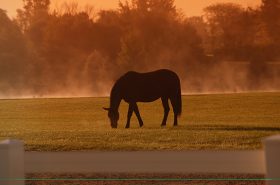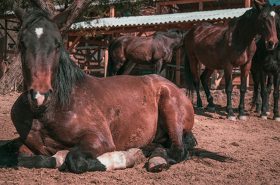You may have noticed that beet pulp is a common ingredient listed in commercial feeds, especially those made for senior horses. You can also purchase beet pulp, alone, and many people choose to do this. But what is beet pulp exactly? Let’s take a closer look.
A by-product in the table sugar-making process, you might find it surprising that beet pulp contains relatively little sugar, itself. However, manufacturers usually add molasses to beet pulp for palatability and to reduce dust. Beet pulp contains approximately 10% protein and 18% fiber, making it easily digestible for horses. It comes in shreds or pellets, but most people prefer the shredded form.
There are quite a few myths surrounding beet pulp (despite its popularity as an ingredient in many commercial feeds). One myth is that it will ‘swell up’ in the horse’s stomach and cause colic. Another myth is that it causes choke. The fact is that many people feed beet pulp to their horses with no problems whatsoever. However, soaking it is always best for horses with dental problems.
While you wouldn’t want to feed beet pulp as the sole source of nutrition since it’s relatively low in vitamin and mineral content, it can be great for easy keepers as a “carrier” for minerals and vitamin supplements. Beet pulp can also be mixed with other ingredients such as oats and rice bran to make a more well-rounded feed.
The following are some of the benefits of beet pulp for horses:
- Can be used as a forage replacer (up to 25-50% of forage) for horses who can’t eat hay or when hay is in limited supply;
- Helps hard-keepers hold weight and can safely help underweight horses gain weight;
- Acts as a pre-biotic, setting up favorable conditions for the ‘good bacteria’ to grow in the horse’s gut;
- Contains relatively low sugar content, making it safe for obese, insulin-resistant, or laminitic horses in most cases (use non-molasses beet pulp or soak and rinse for the least amount of sugar); and
- Safe to feed for older horses with dental problems when served as a mash.
Beet pulp may not be the answer for every horse, but I’ve fed it to my own horses as part of a forage-based diet and have been very happy with it. It may be something you’d like to add to your feeding program as well.
If you have experience feeding beet pulp, feel free to share about it in the comments!
Love this blog post? We think you will like How to Know it’s Time to Reevaluate your Horses Diet.



